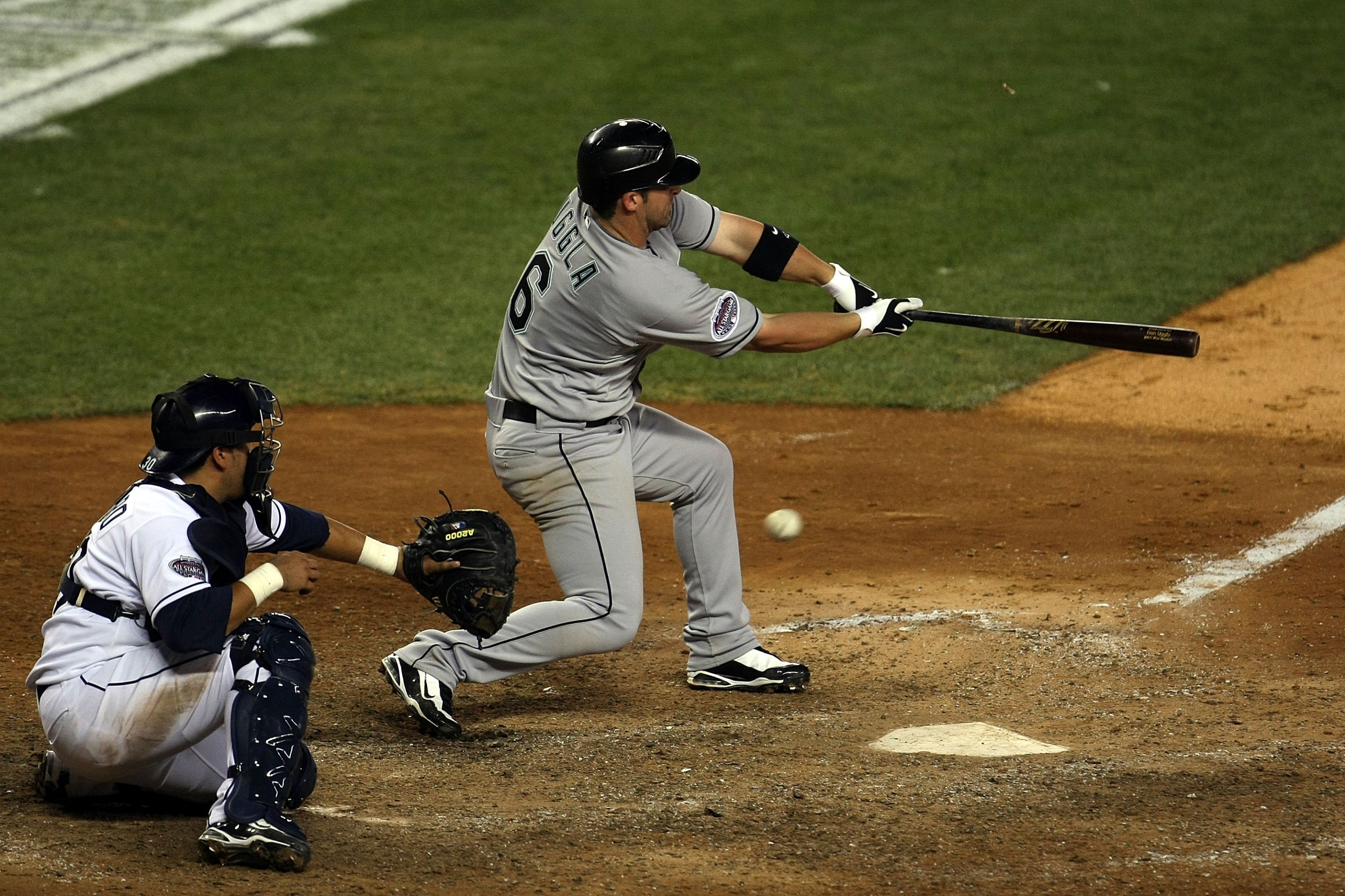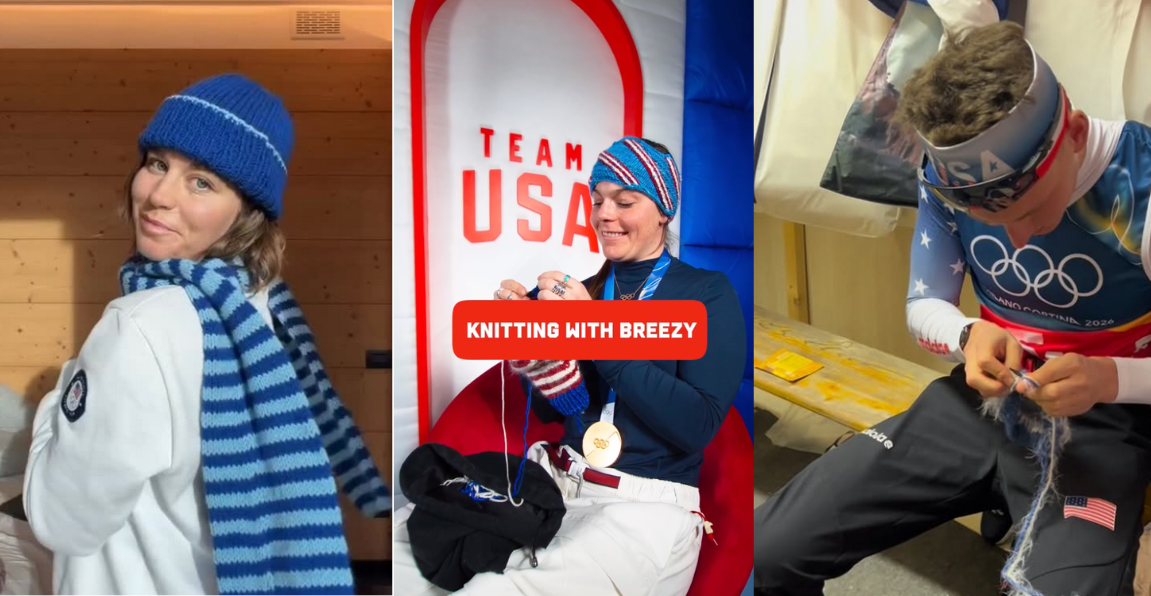We are each of us allotted a certain and finite number of hours on earth, and there is no law or rule or norm dictating that any of those should be spent watching the Major League Baseball All-Star Game. Even if you are among the Americans who still go to an office, and even if that office has not replaced its water cooler with something motion-activated and perpetually on the fritz, and even if the cultural siloing and antisocial tendencies that go a long way toward defining the present era have not obliterated old rituals around that gurgling totem, I can promise you this: You will not find yourself out of the loop with your coworkers if you can’t break down the “Battle of Luises” contested between Castillo and Arraez in the fifth inning.
Still, on the off chance you steered to this blog for viewing advice: The MLB All-Star Game is deeply lame. It offers the public worse baseball played for lower stakes by more skilled but less interested players, against a backdrop of mawkishness on one end and pitiful relevance-hunting on the other. At some point Tuesday night, John Smoltz will get weepy about Sandy Koufax; at another, Kyle Schwarber will record history’s least viral TikTok. But occasionally there comes a man who can elevate the Midsummer Classic not by transcending any of that, but by leaning—or, more accurately, by falling ass-over-teakettle—into it. This perfect marriage of medium and artist is rare, but it has happened. In July 2008, Dan Uggla was the dope with the paintbrush.
As an emblem of the changes baseball underwent in the aughts—the slow-then-sudden embrace of certain statistics, the abandoning in response of long-held aesthetic conventions—Uggla was unassailable. He played second base, at the first moment in history when someone of his proportions, skill set, and temperament was allowed to do so. Into the position staffed traditionally by some of the most graceful and intuitive athletes the sport has known stepped this snarling and wildly overvascular rectangle, his name a Pynchonian bullseye, his swing a mad-at-dad uppercut. He tended to either rocket a homer or corkscrew himself thorax-deep into the batter’s-box dirt. He did not hit many grounders or convincingly field them. He was an anthropomorphized energy drink reared on Gary Sheffield highlights, a mitt affixed to a blocking sled.
As it happened, Uggla was also an All-Star in ‘08, for the second time in his three years with the Florida Marlins. He deserved it. Over the first 95 games of that season, he socked 23 homers and put up a .978 OPS, paying out the bet the Marlins made when they claimed him in the White Elephant Party of the Rule 5 Draft back in 2005: that whatever glove-flailing and own-shoelace-stepping indignities he suffered defensively would be made up for by his pioneering work in the field of forearm circumference. Uggla was who he was, and when he showed up at Yankee Stadium, both the worst-case and the likeliest scenario seemed to be that he’d strike out a time or two while Tim McCarver talked about Joe Morgan.
Instead, Uggla, as part of the last wave of position players off the National League’s bench, entered in the sixth inning of a game that would, heinously and hilariously, go 15, wrapping up well past one in the morning. These were the days when the All-Star Game determined home-field advantage in the World Series, so for whatever anti-competitive decisions had been made in the spirit of inclusion—Joe Crede replaces Alex Rodriguez, reads a cursed snippet of the Baseball-Reference log—it had to declare a winner. Uggla got nine and a half frames, therefore, with which to author what is still an unparalleled All-Star Game masterpiece: an oh-for-four with three strikeouts and three errors, a ballet of musclebound misery.
Top of the 8th, 1 on, no outs, NL 2, AL 2—K
Our hero survived his first inning and a half without incident, even snagging a pop-up, before he came up to bat against Jonathan Papelbon in the eighth. Papelbon threw a high heater; Uggla swung late and under it. Nothing too shameful, all told, but he received a lovely intro from Joe Buck, who called Uggla “maybe one of the best hitters you at home have never heard of.” Buck went on, “All this guy does, a former Rule 5 pick from Arizona, is pound home runs.”
Top of the 10th, runners on first and third, one out, NL 3, AL 3—GIDP
In the 10th inning, Russell Martin worked an eight-pitch at-bat for a single off Mariano Rivera. Miguel Tejada then pushed Martin to third via a hit-and-run, with an assist from the shortstop stylings of Michael Young. (Just a tremendous sampling of stiff-hipped gentlemen, here.) Better hitters than Uggla have chunked Mo’s cutter into the dirt, in bigger spots. Still, boy did Dan ever chunk it. Anything but a double-play, and Uggla could have been … well, if not a hero, the dude who let everyone go off and get up to whatever they wanted to get up to on a work trip in New York. But despite huffing it down the line, Uggla couldn’t beat out a (not particularly smooth or quick) relay from Ian Kinsler and Young. The game stayed tied. The game kept going.
Bottom of the 10th, bases empty, no outs, NL 3, AL 3—E4
The reason marsupials have such short arms, according to Jim Cooper of Syracuse University, is that, as little ‘roo tykes, they need those things close to full power pretty much out of the gate, for hauling themselves up into their mother’s pouch. There’s a tradeoff involved: What is strong early stays stumpy later. “The idea is that since they need the forelimbs to climb across their mother’s belly at birth, they end up ‘stuck’ with this forelimb shape in later life,” Cooper said. I like to imagine a similar dynamic at work between 4-year-old Daniel and the Uggla family bench press. Anyway, in the bottom of the 10th, he couldn’t quite reach a Young bouncer. The official scorer ruled it an error.
Bottom of the 10th, one on, no outs, NL 3, AL 3—E4
On the very next pitch, Carlos Quentin rolled a routine double-play grounder right at Uggla, who, as you might by this point guess, did something not at all routine with it. That it was hit smack between his feet set off a recognizable Oop! Oop! response, the ball and Uggla two smartphone-sunk pedestrians meeting mid-crosswalk. Uggla lurched down after it in a manner that, watched back now, triggers in me a flare-up of sympathy sciatica. The ball skidded under his glove, Uggla toppled over, and Buck said, “Wow.”
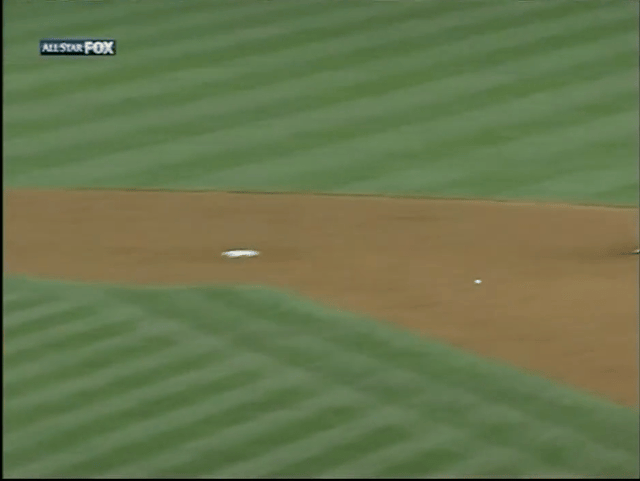
An intentional walk followed, and a merciful universe might have taken the situation that resulted—bases loaded, no outs, one “second baseman” cross-eyed with embarrassment and rage at back-to-back biffs—and ordered up a game-ending RBI. In ours, the National League got out of the jam, thanks in part to another ground ball that Uggla managed to throw to home plate and not into his own kneecap.
Top of the 12th, bases loaded, one out, NL 3, AL 3—K
If I’m being a tad mean, it’s not because I know anything distasteful about Dan Uggla personally, but rather because he seems to me the hardest-etched vector of the artlessness and cynicism that had then started to characterize the 21st-century iteration of his sport. The strain of Hedge Fund Brain that had made front offices understand and package players as bundles of nested statistical variances had by this point jumped containment and begun to infect players themselves. Uggla was its perfect host: bereft of idiosyncrasy, the algorithm as style. I hoped that baseball—and life, I guess—rewarded a different disposition, and so took his triumphs as affronts and failures as good omens.
Joakim Soria, a reliever (and fellow former Rule 5 pick) brought on after the AL had exhausted its Papelbon-Rivera-Francisco Rodriguez trifecta, was in every sense Uggla’s opposite. Facing Uggla for the first time in his life in the 12th inning, Soria started him with two fastballs and from those deduced everything he needed to know. The third pitch was a 67-mph curveball, rainbowed into the heart of the zone. Uggla swung a strand of wet spaghetti. My soul sings.
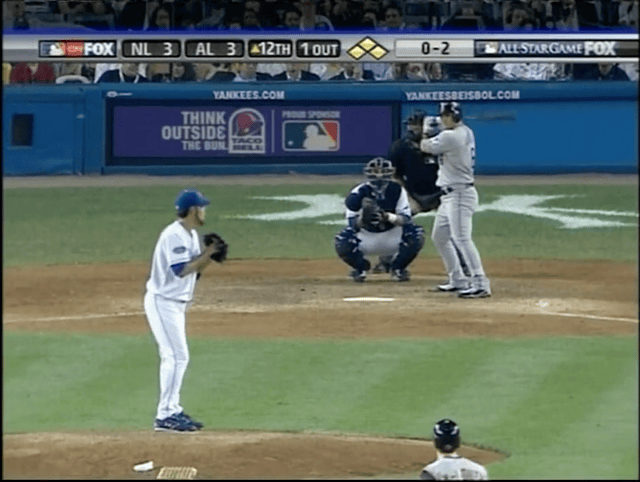
Bottom of the 13th (I mean, can you imagine?), bases empty, one out, NL 3, AL 3—E4
This one wasn’t really his fault. A J.D. Drew grounder caught a divot on its last hop and shot up into Uggla’s belly, where he corralled it and flipped it to first but not in time. McCarver (rightly, to my thinking) campaigned for the play to go as a base hit. Still, this is the All-Star Game we’re talking about, and if you’ve spent the whole night playing jai alai with your mitt, and you have the chance to make up for it with a more-taxing-than-average play, you should by rights do some Star Shit! I thank the official scorer, who evidently agreed, for helping justify this 14-years-later blog.
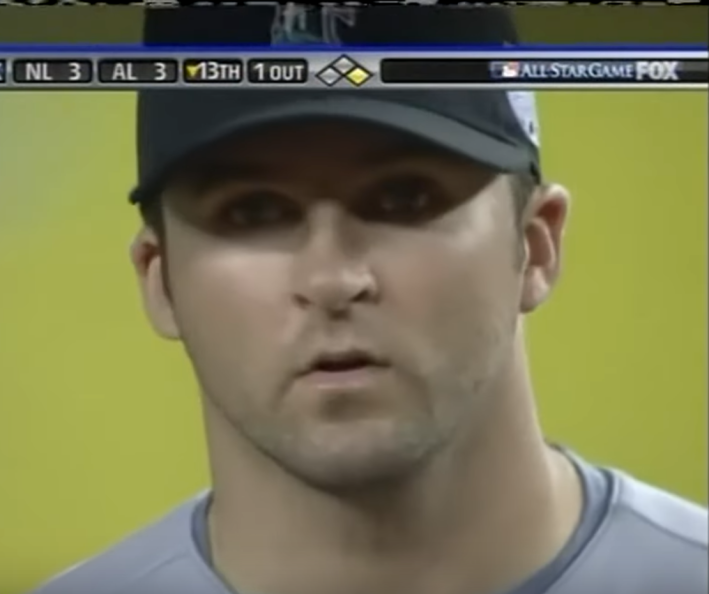
Top of the 15th, bases empty, no outs, NL 3, AL 3—K
The whole strategic and analytic deal, with a three-true-outcome guy like Uggla, was that over the long haul what he did and what he didn’t do would shake out to his team’s credit. Really, the unattractiveness of his style comprised part of his value: Where shortsighted clubs concerned with their middle infielders “being able to extend their limbs fully” might look at the micro—the swings and misses, the makeable plays unmade—enlightened organizations shepherded by front-office seers with deep rotations of sleek glasses frames would wait for the homers that compensated for all that.
You can see why a one-game exhibition might not be a great showcase for a guy like this. Even so, he came to the dish in the 15th with a chance to render the ideal Uggla experience in miniature. One grunty mash to erase a whole night of fuckups. Instead, perhaps due to the sheer draining embarrassment of a chin up, buddy, from Chipper Jones, Uggla swung through a Scott Kazmir fastball. It was the last mark he’d make on this box score. Who won the game? Who cares? I can say it wasn’t Dan friggin’ Uggla, that’s for sure.
“I never was down,” Uggla said after the game at his locker. “You shake it off, you move on, you keep playing.” He insisted that he’d enjoyed his night, and—that famous thing you say about nights you enjoy—that it would have no bearing on the rest of his season. It’s tough to tell whether he was right. Uggla’s OPS was 200 points lower in the second half than it was in the first, and he managed just nine homers, and he also ended up with the fourth-most strikeouts in baseball—these might have been indicators of cratered confidence, or they might just have been Uggla Uggla-ing.
He would top 30 home runs in each of the next two years, and then do it again after being traded to the Braves. He’d make another All-Star team, too, in a season in which he led the league in walks and somehow still put up an OPS+ of 98. The point here is not to investigate the effect that one nightmare outing had on a career—this seems like a good place to point out that Uggla made more than $75 million as a big-leaguer and has settled into a post-retirement life seemingly free of the fourth-story-on-TMZ buffoonery that can befall ex-MLBers in the American southeast—nor (mostly) to heap dirt on a grating athlete. It surely is not to encourage you to watch tonight’s All-Star Game in the hopes of seeing something similar, or for any other reason. The point is to appreciate baseball, even in its most cloying and contrived and purposefully player-friendly version, still holding in reserve some of its definitional ability to ruin your life. The All-Star Game is a joke, but this sport can always play a bigger one.
